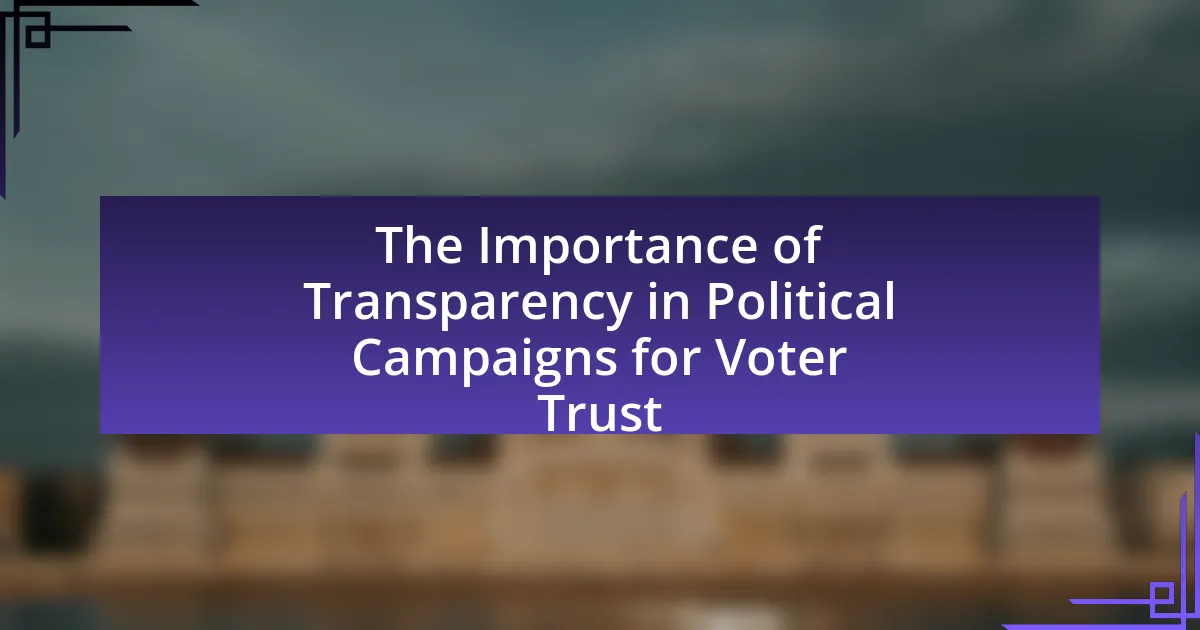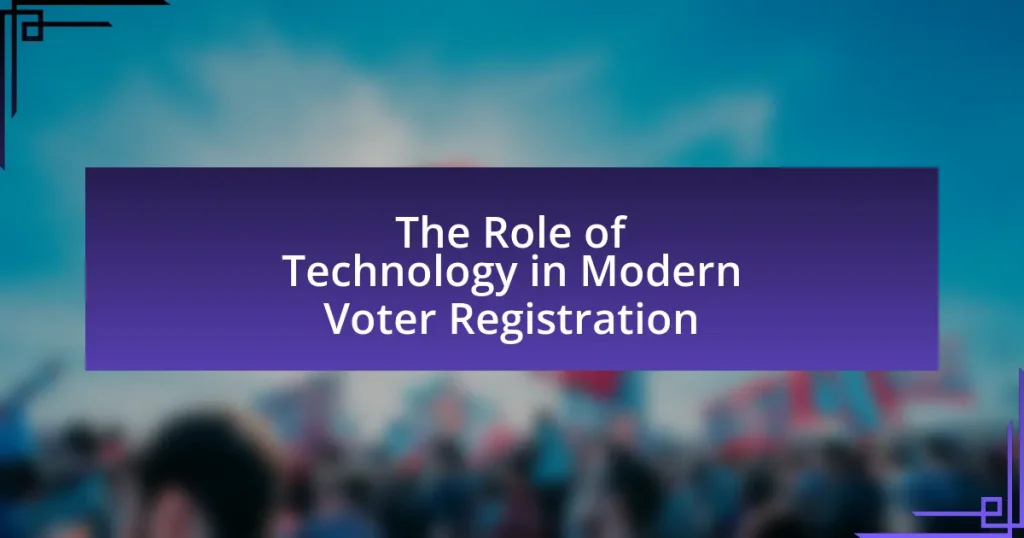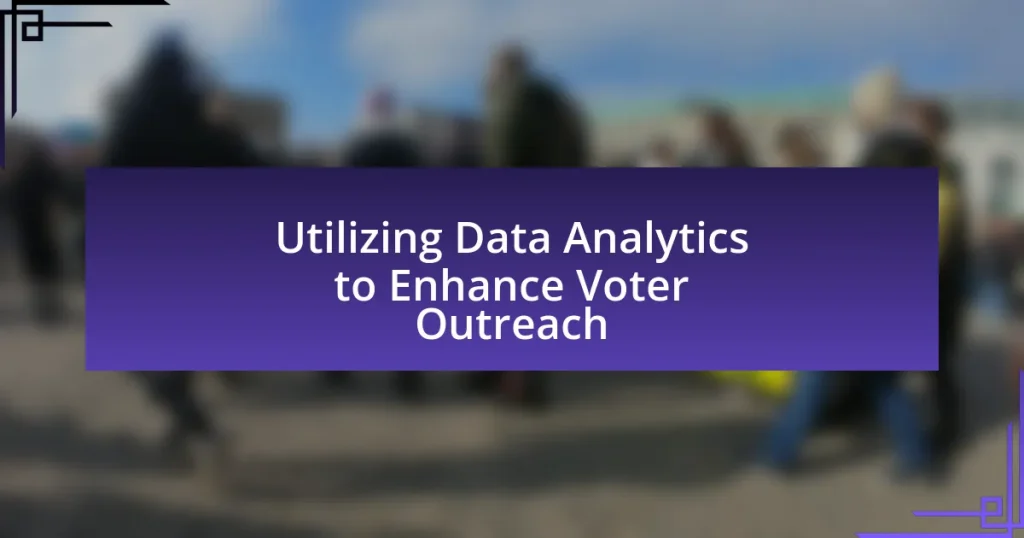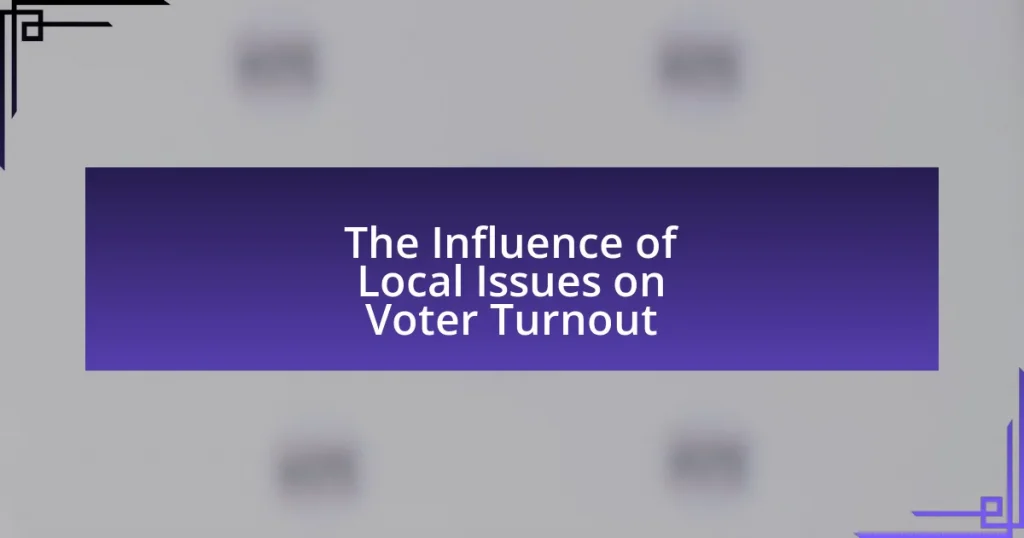The article focuses on the significance of transparency in political campaigns and its impact on voter trust. It highlights that transparency fosters accountability and integrity, leading to increased voter support and engagement. Key elements of transparency include clear communication of campaign financing, disclosure of candidate positions, and open access to campaign activities. The article also discusses the challenges political campaigns face in maintaining transparency, the consequences of a lack of transparency, and practical steps voters can take to demand greater openness from candidates. Overall, it emphasizes that transparency is essential for a healthy democracy and informed electoral participation.
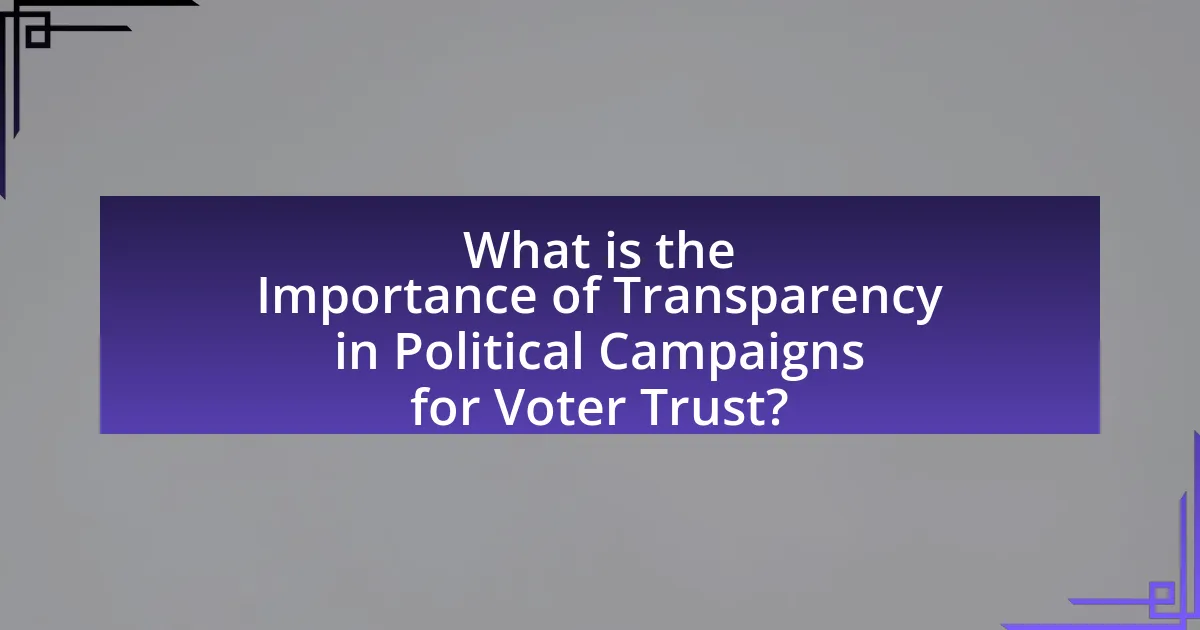
What is the Importance of Transparency in Political Campaigns for Voter Trust?
Transparency in political campaigns is crucial for building voter trust. When candidates openly share their policies, funding sources, and decision-making processes, it fosters a sense of accountability and integrity. Research indicates that voters are more likely to support candidates who demonstrate transparency, as it reduces skepticism and enhances perceived credibility. For instance, a study by the Pew Research Center found that 70% of voters believe that transparency in campaign financing is essential for a fair electoral process. This connection between transparency and trust is vital for a healthy democracy, as it encourages informed voting and civic engagement.
Why is transparency crucial in political campaigns?
Transparency is crucial in political campaigns because it fosters voter trust and accountability. When candidates openly share their policies, funding sources, and decision-making processes, they enable voters to make informed choices. Research indicates that 70% of voters are more likely to support candidates who demonstrate transparency regarding their campaign financing and policy positions. This trust is essential for a healthy democracy, as it encourages civic engagement and participation in the electoral process.
How does transparency influence voter perceptions?
Transparency significantly enhances voter perceptions by fostering trust and credibility in political candidates. When candidates openly share their policies, funding sources, and decision-making processes, voters are more likely to view them as honest and reliable. Research conducted by the Pew Research Center indicates that 70% of voters prioritize transparency in political communication, believing it directly correlates with integrity. This perception is crucial, as candidates who are perceived as transparent often experience increased voter engagement and support, ultimately influencing electoral outcomes.
What role does transparency play in democratic processes?
Transparency is essential in democratic processes as it fosters accountability and trust between the government and its citizens. When political actions, decisions, and campaign financing are openly disclosed, voters can make informed choices, which enhances the legitimacy of the electoral system. Research indicates that transparency in political campaigns leads to increased voter engagement; for instance, a study by the Pew Research Center found that 70% of voters believe that transparency in campaign financing is crucial for a fair election. This level of openness not only deters corruption but also encourages public participation, ultimately strengthening the democratic framework.
What are the key elements of transparency in political campaigns?
The key elements of transparency in political campaigns include clear communication of campaign financing, disclosure of candidate positions, and open access to campaign activities. Clear communication of campaign financing involves publicly reporting contributions and expenditures, which helps voters understand the financial influences on candidates. Disclosure of candidate positions requires candidates to provide detailed information about their policies and intentions, allowing voters to make informed decisions. Open access to campaign activities means that events and interactions with voters are conducted in a manner that is visible and accountable, fostering trust. These elements are essential for building voter confidence and ensuring an informed electorate.
What information should candidates disclose to voters?
Candidates should disclose their policy positions, funding sources, and any potential conflicts of interest to voters. Transparency regarding policy positions allows voters to understand candidates’ stances on key issues, while disclosure of funding sources helps voters assess the influence of special interests on candidates. Additionally, revealing potential conflicts of interest ensures that voters are aware of any personal or financial ties that may affect a candidate’s decision-making. These disclosures are essential for fostering trust and informed decision-making among the electorate.
How can transparency be measured in political campaigns?
Transparency in political campaigns can be measured through the disclosure of campaign finance information, the clarity of communication regarding policy positions, and the accessibility of candidate information to the public. Campaign finance transparency is quantified by the timely reporting of donations and expenditures, which is mandated by laws such as the Federal Election Commission regulations in the United States. Clear communication is assessed by evaluating how well candidates articulate their policies and respond to public inquiries, often analyzed through media coverage and public opinion surveys. Accessibility is measured by the availability of candidate information on official campaign websites and public forums, which can be tracked through user engagement metrics and accessibility audits. These methods provide a comprehensive framework for assessing transparency in political campaigns, thereby influencing voter trust.
How does transparency affect voter trust?
Transparency significantly enhances voter trust by providing clear and accessible information about candidates, policies, and electoral processes. When voters perceive that information is openly shared and that there are no hidden agendas, they are more likely to feel confident in their electoral choices. Research conducted by the Pew Research Center indicates that 70% of voters believe transparency in government leads to greater trust in political institutions. This correlation suggests that when political campaigns prioritize transparency, they foster a more informed electorate, which in turn strengthens democratic engagement and trust in the electoral system.
What are the consequences of a lack of transparency?
A lack of transparency in political campaigns leads to diminished voter trust and increased skepticism towards candidates. When voters perceive that information is being withheld or manipulated, they are less likely to engage with the electoral process, which can result in lower voter turnout. Research by the Pew Research Center indicates that 70% of Americans believe that transparency is essential for trust in government, highlighting the critical role that openness plays in fostering public confidence. Furthermore, a lack of transparency can lead to the spread of misinformation, as voters may fill the gaps in their knowledge with unverified claims, further eroding trust in political institutions.
How does transparency build long-term voter relationships?
Transparency builds long-term voter relationships by fostering trust and accountability between voters and political candidates. When candidates openly share their policies, funding sources, and decision-making processes, voters feel more informed and engaged. This openness reduces skepticism and enhances the perception of integrity, leading to stronger emotional connections. Research indicates that 70% of voters are more likely to support candidates who demonstrate transparency in their campaigns, as it aligns with their desire for honesty and ethical behavior in politics. Thus, transparency not only cultivates trust but also encourages sustained voter loyalty over time.
What challenges do political campaigns face in maintaining transparency?
Political campaigns face significant challenges in maintaining transparency, primarily due to the complexity of campaign financing and the strategic management of information. Campaigns often rely on large donations from various sources, which can obscure the true influence of special interests and lead to public skepticism about the candidates’ motivations. For example, the Center for Responsive Politics reported that in the 2020 U.S. elections, over $14 billion was spent, making it difficult for voters to trace the origins and implications of funding. Additionally, the rapid dissemination of information through social media can lead to misinformation, complicating efforts to provide clear and accurate communication to the electorate. This environment creates a paradox where the need for transparency is heightened, yet the mechanisms to achieve it are often hindered by financial complexities and the fast-paced nature of modern communication.
What are common obstacles to transparency in political messaging?
Common obstacles to transparency in political messaging include misinformation, lack of access to information, and strategic obfuscation by political actors. Misinformation can distort public perception and create confusion, making it difficult for voters to discern the truth. Lack of access to information arises when political entities do not provide clear, comprehensive data about their policies or funding sources, hindering informed decision-making. Strategic obfuscation occurs when politicians intentionally use vague language or complex jargon to obscure their true intentions, further complicating transparency efforts. These factors collectively undermine voter trust and the integrity of the political process.
How can campaigns overcome these challenges?
Campaigns can overcome challenges related to transparency by implementing clear communication strategies and utilizing technology to enhance voter engagement. By providing accessible information about campaign policies, funding sources, and decision-making processes, campaigns can build trust with voters. For instance, a study by the Pew Research Center found that 70% of voters prioritize transparency in political communications, indicating that when campaigns openly share their intentions and operations, they are more likely to gain voter confidence. Additionally, leveraging social media platforms allows campaigns to interact directly with constituents, addressing concerns in real-time and fostering a sense of accountability.
How can transparency be effectively communicated to voters?
Transparency can be effectively communicated to voters through clear, consistent messaging and accessible information. Political campaigns should utilize multiple platforms, such as social media, official websites, and public forums, to share detailed information about policies, funding sources, and decision-making processes. For instance, a study by the Pew Research Center found that 64% of voters appreciate candidates who provide clear information about their positions and funding, indicating that transparency fosters trust. Additionally, engaging voters through Q&A sessions and town hall meetings allows for direct interaction, further enhancing the perception of openness and accountability.
What strategies can candidates use to enhance transparency?
Candidates can enhance transparency by openly sharing their campaign financing sources and expenditures. By providing detailed reports on donations and spending, candidates build trust with voters, as evidenced by studies showing that transparency in financial matters correlates with increased voter confidence. Additionally, candidates can engage in regular communication through public forums and social media, allowing voters to ask questions and receive direct responses, which further fosters an environment of openness.
How can social media be leveraged for transparent communication?
Social media can be leveraged for transparent communication by providing real-time updates and direct engagement between political campaigns and voters. This platform allows candidates to share their policies, decisions, and responses to public inquiries instantly, fostering an open dialogue. For instance, a study by the Pew Research Center found that 69% of adults in the U.S. use social media, making it an effective tool for reaching a broad audience and enhancing accountability. By utilizing features like live Q&A sessions, polls, and direct messaging, campaigns can create a more inclusive environment where voters feel heard and informed, ultimately building trust.
What best practices should political campaigns follow to ensure transparency?
Political campaigns should adopt best practices such as full disclosure of campaign finances, clear communication of policy positions, and regular updates on campaign activities to ensure transparency. Full disclosure of campaign finances, including sources of funding and expenditures, builds trust and allows voters to understand potential influences on candidates. Clear communication of policy positions helps voters make informed decisions, while regular updates on campaign activities keep the electorate engaged and informed. According to a study by the Pew Research Center, transparency in political campaigns significantly enhances voter trust, as 70% of voters believe that knowing where candidates stand on issues is crucial for their decision-making process.
What role do ethics play in promoting transparency?
Ethics play a crucial role in promoting transparency by establishing standards of conduct that guide behavior in political campaigns. When ethical principles are upheld, candidates and their teams are more likely to disclose information honestly, fostering trust among voters. For instance, adherence to ethical guidelines can lead to the accurate representation of campaign financing, as seen in the Federal Election Commission’s regulations that require disclosure of contributions. This transparency not only enhances accountability but also empowers voters to make informed decisions, thereby reinforcing the integrity of the electoral process.
How can transparency initiatives be evaluated for effectiveness?
Transparency initiatives can be evaluated for effectiveness through measurable outcomes such as increased voter trust, engagement levels, and public perception. For instance, studies have shown that transparency in political campaigns correlates with higher voter turnout; a 2018 study by the Pew Research Center found that 70% of voters felt more confident in candidates who openly shared their campaign financing sources. Additionally, surveys can assess public awareness and understanding of transparency measures, providing quantitative data on their impact. Analyzing changes in voter behavior before and after the implementation of transparency initiatives also offers concrete evidence of their effectiveness.
What practical steps can voters take to demand transparency from candidates?
Voters can demand transparency from candidates by actively engaging in the electoral process through specific actions. First, they can research candidates’ backgrounds, including their voting records, campaign financing, and public statements, to assess their commitment to transparency. According to a 2020 study by the Pew Research Center, 62% of voters believe that knowing a candidate’s funding sources is crucial for making informed decisions.
Second, voters can attend town hall meetings and public forums to directly question candidates about their policies and funding. Engaging in dialogue allows voters to hold candidates accountable for their promises. Third, voters can utilize social media platforms to raise awareness about transparency issues and encourage discussions around candidates’ commitments to openness.
Finally, voters can support organizations that advocate for campaign finance reform and transparency, such as the Center for Responsive Politics, which provides data on campaign contributions and lobbying efforts. By taking these steps, voters can effectively demand greater transparency from candidates, fostering a more trustworthy political environment.
